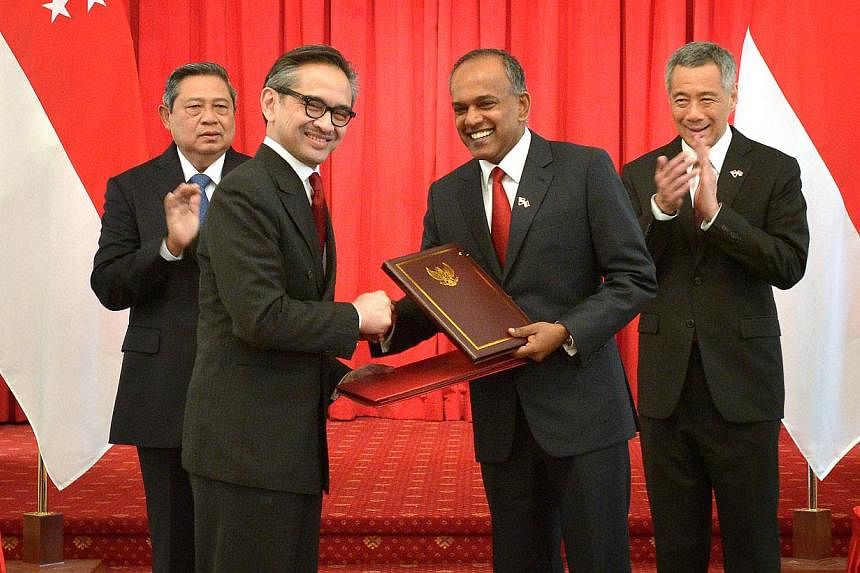Indonesian President Susilo Bambang Yudhoyono said his country's signing of a maritime boundary delimitation agreement with Singapore was an important signal amid concern over recent global developments.
"In a world marked by tension and disputes, with this treaty, we are demonstrating that with strong political commitment, it is possible to achieve mutually acceptable solutions," he said yesterday in a speech at a state banquet at the Istana to honour his visit.
"Through this agreement, we celebrate a new milestone in our bilateral relations."
Earlier in the afternoon, Dr Yudhoyono and Prime Minister Lee Hsien Loong witnessed the signing of the treaty demarcating boundaries in the eastern stretch of the Singapore Strait, between their respective foreign ministers, Dr Marty Natalegawa and Mr K. Shanmugam.
The agreement is the second maritime boundary pact between both countries under the Yudhoyono administration.
"It is a demonstration of how Indonesia and Singapore have been able to work together in areas of mutual interest, and further underscores the excellent working relationship and bilateral ties between both countries," Singapore's Foreign Ministry said.
In a separate statement, Indonesia's Foreign Ministry said the agreement is a reminder for other countries in the region that border disputes can be managed in a peaceful manner, in line with international law. "The settlement of maritime boundary negotiations between Indonesia and Singapore can be a reference for the settlement of border disputes between countries in the region in a way that is peaceful and in line with the principles of international maritime law," it said.
Indonesia's comments come amid concern among Asean countries over rising tensions in the South China Sea in recent months, and Indonesia and Singapore have been strong advocates of applying international law to resolve disputes in those waters.
Indonesia also noted that the delimiting of maritime boundaries was done with reference to the 1982 United Nations Convention on the Law of the Sea (Unclos), and negotiated in line with the national interests of both countries.
The boundary agreed on in the latest treaty spans a 5.1 nautical mile stretch between Changi and Batam.
Technical discussions began in Singapore in June 2011. Nine more rounds took place, with meetings alternating between the two countries. The 10th and final round of talks was held in Medan this Aug 18 and 19, and it was then that both sides finalised the deal.
The neighbours agreed on the maritime boundary along the central part of the Singapore Strait in 1973. They reached agreement on boundaries in the western section, between Sultan Shoal and Pulau Nipa, in 2009.
After yesterday's treaty, only one last stretch - between Pedra Branca and Bintan - remains to be demarcated. However, it will have to wait for talks between Singapore and Malaysia on delimiting maritime borders around Pedra Branca, Middle Rocks and South Ledge.
Indonesia's Foreign Ministry said yesterday's signing would provide certainty over the border between both countries, strengthen bilateral ties and encourage further cooperation in various fields.
"The agreement will provide real benefits to Indonesia and Singapore in maintaining sovereignty and enforcing the law in the territorial waters of the two countries, and in strengthening cooperation in the field of navigational safety, maritime affairs and fisheries, as well as in preventing cross-border crime in the Strait of Singapore," the ministry said.


